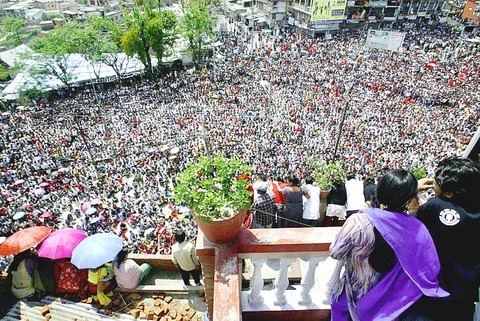Nepal's opposition alliance called off weeks of pro-democracy protests yesterday and named a former prime minister as its choice to head a new government, after the king gave in to a key demand to reinstate parliament.
But the Maoist insurgents who supported the demonstrators throughout their often-bloody standoff rejected the king's offer, a sign that the turmoil was not over.
Opposition leaders, meanwhile, said former prime minister Girija Prasad Koirala, a veteran politician and head of the country's largest party, the Nepali Congress, was the alliance's choice to head the new government.

PHOTO: AP
Koirala, however, made no immediate comment.
King Gyanendra's late-night speech -- a pivotal concession which effectively returned authority to elected politicians and could result in a dramatic reduction in royal power -- was welcomed across Kathmandu, and tens of thousands of people gathered in a park in the center of town to celebrate their victory.
While dozens of riot police were lined up to stop marchers from heading toward the palace, the few people who tried to get past turned back when the police politely asked them.
The demonstrators said they were thrilled by the return of parliament, but some also remained skeptical of their political leaders, few of whom have much popularity outside their own parties.
"Nepal is free again, and we're here to make sure it will remain free forever," said demonstrator Sunita Maharjan.
The Maoists, though, called the king's speech "a conspiracy to protect the regime," according to a statement signed by rebel leader Prachanda and his deputy, Baburam Bhattarai, and e-mailed to journalists.
They said they had been betrayed by the opposition alliance, with whom they had become allied to oust the king, and vowed to press ahead with blockades that have sealed off major roads for weeks and led to serious shortages of food and fuel in the capital.
"By accepting the so-called royal proclamation the leaders of these seven political parties have once again made a blunder," said the statement from the Maoists, whose 10-year campaign for power has left more than 13,000 people dead and given them control over much of the countryside.
The king's announcement, which came near midnight on Monday, followed weeks of mass protests that had threatened to force him from power. The protests sparked clashes with security forces that left 14 demonstrators dead and the country dangerously volatile.
It remained unclear just what the split between the Maoists and the parties would mean.
The seven-party alliance, which will take the lead when parliament is reconvened, had said it wanted to pull the Maoists into the political mainstream, and planned to declare a ceasefire with them once a new government was formed.
"We will work together with the Maoists," Krishna Sitaula, a top Nepali Congress official and alliance spokesman, said after emerging from closed-door discussions among party leaders.
The opposition also formally called off the protests and strike.

MAKING WAVES: China’s maritime militia could become a nontraditional threat in war, clogging up shipping lanes to prevent US or Japanese intervention, a report said About 1,900 Chinese ships flying flags of convenience and fishing vessels that participated in China’s military exercises around Taiwan last month and in January last year have been listed for monitoring, Coast Guard Administration (CGA) Deputy Director-General Hsieh Ching-chin (謝慶欽) said yesterday. Following amendments to the Commercial Port Act (商港法) and the Law of Ships (船舶法) last month, the CGA can designate possible berthing areas or deny ports of call for vessels suspected of loitering around areas where undersea cables can be accessed, Oceans Affairs Council Minister Kuan Bi-ling (管碧玲) said. The list of suspected ships, originally 300, had risen to about

DAREDEVIL: Honnold said it had always been a dream of his to climb Taipei 101, while a Netflix producer said the skyscraper was ‘a real icon of this country’ US climber Alex Honnold yesterday took on Taiwan’s tallest building, becoming the first person to scale Taipei 101 without a rope, harness or safety net. Hundreds of spectators gathered at the base of the 101-story skyscraper to watch Honnold, 40, embark on his daredevil feat, which was also broadcast live on Netflix. Dressed in a red T-shirt and yellow custom-made climbing shoes, Honnold swiftly moved up the southeast face of the glass and steel building. At one point, he stepped onto a platform midway up to wave down at fans and onlookers who were taking photos. People watching from inside

Japan’s strategic alliance with the US would collapse if Tokyo were to turn away from a conflict in Taiwan, Japanese Prime Minister Sanae Takaichi said yesterday, but distanced herself from previous comments that suggested a possible military response in such an event. Takaichi expressed her latest views on a nationally broadcast TV program late on Monday, where an opposition party leader criticized her for igniting tensions with China with the earlier remarks. Ties between Japan and China have sunk to the worst level in years after Takaichi said in November that a hypothetical Chinese attack on Taiwan could bring about a Japanese

STREAMLINED: The dedicated funding would allow the US to transfer equipment to Taiwan when needed and order upgraded replacements for stockpiles, a source said The US House of Representatives on Thursday passed a defense appropriations bill totaling US$838.7 billion, of which US$1 billion is to be allocated to reinforcing security cooperation with Taiwan and US$150 million to replace defense articles provided to the nation. These are part of the Consolidated Appropriation Act, which the US House yesterday passed with 341 votes in favor and 88 against. The act must be passed by the US Senate before Friday next week to avoid another government shutdown. The US House Committee on Appropriations on Monday unveiled the act, saying that it allocates US$1 billion for the Taiwan Security Cooperation Initiative